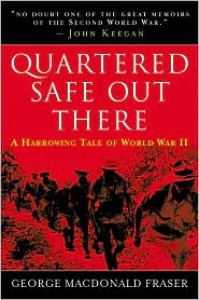Currently reading
Quartered Safe Out Here , by George MacDonald Fraser

I'm reading George MacDonald Fraser's (1925 – 2008) Flashman series with a curious mixture of pleasure and distaste - the pleasure arising from the excellent adventures of the ne'er-do-well Flashman, the wonderfully reconstructed historical settings and the satire of (as I see it) British upper classes, patriotism and hero worship of military heroes (not of military heroism itself, mind); the distaste sweeping out of the many signs of racism and acts of rape and violence towards women. Of course, the latter are to be expected in a novel set in the early 19th century, but in the first volume of the Flashman series the protagonist is the primary implementer of said outrages.
To deal with my ambivalence I had to learn more about the author, so when I found that he had written a memoir of the Burmese corner of World War II which had been called "one of the great memoirs of the Second World War" by John Keegan, a well known military historian, I obtained a copy and dived right in.
Quartered Safe Out Here (1992) is that memoir. As a fresh 19 year old recruit, MacDonald Fraser is inserted into a veteran unit engaged in pushing the Japanese out of Burma in 1945. VE Day is close, but the Japanese are unimpressed and are still a powerful force in Burma, though increasingly poorly supplied. By that time the American submarine fleet had swept the sea of Japanese cargo ships, and they and the air fleet kept the Japanese warships in harbor. The last suicide mission of the Japanese navy was yet to come.
I've read at least a dozen WW II memoirs written by ordinary soldiers (American, British, German and Japanese), and I have found them all gripping, really. But this book (and William Manchester's memoirs) has the advantage of being written by an experienced author, and it shows.
MacDonald Fraser's evocation of the soldiers, landscape and atmosphere of that campaign is wonderful, as is his presentation of a novice soldier's experience of firefights - the compression and extension of time like an accordion, the random choice of friends who fall, the absence of conscious thought as training and instinct take over. The (real) adventures and humor are plentiful; even in the attack on Pyawbwe, which broke the back of the Japanese 33rd Army, MacDonald Fraser managed to get dropped down a well!
MacDonald Fraser's unit was composed primarily of men from Cumberland, and he lets them speak in Cumbrian in the book. It sounds a bit like Scots to me, which is reasonable enough, since the dialects are spoken in contiguous regions. Some hilarious passages in the book are carried out entirely in that dialect. An example: the division had worked out a complicated password scheme which was beyond the mental capacity of a few of the soldiers. One of those few was trying to get back into the lines and screwed up the password. The entire exchange was carried out in Cumbrian (what are the chances that the Japanese even knew about the dialect, much less could reproduce it), and the men knew exactly with whom they were speaking, but the farce had to be played out to the end, increasingly salted with colorful invective. I was propped up in bed with tears rolling down my face.
Here's a taste of the Cumbrian when they were slogging through the Burmese dry belt: "Wahm? Ah's aboot boogered! By hell, Ah could do wi' some fookin' joongle, Ah tell tha!" Maybe I'm alone here, but I think this is priceless.
MacDonald Fraser still hated the Japanese in 1992, quoting approbatively an officer who called them "a shower of sub-human apes." And I couldn't say that his view of other races (indeed, anyone except Brits, Americans and Gurkhas) is any more advanced than that of Flashman. In at least this respect, Flashman is made in the image of his creator.
Returning to my original ambivalence, what is evident from this memoir and other sources on the web (e.g.
http://www.telegraph.co.uk/comment/3553305/George-MacDonald-Fraser-was-no-Flashman.html
http://www.independent.co.uk/news/obituaries/george-macdonald-fraser-writer-whose-tales-of-flashman-changed-the-face-of-british-historical-fiction-768103.html )
is that MacDonald Fraser was a strange mixture of rigid conservative and rambunctious rebel who retreated to a tax haven, the Isle of Man, and inveighed against the poofs and pinkos running the country. The only analogy for the man I can draw from my own life are the folks Americans call rednecks - socially and politically arch-conservative, basically contemptuous and distrustful of anybody who is not "a good old boy" (racism is a natural corollary), but nonetheless ready to shoot any "revenooer" who stumbles across their still, marijuana field or crystal meth lab and to complain bitterly about the federal government's intrusion into their rights. Strangely enough, their beat up pickup trucks are usually plastered with "patriotic" bumper stickers...
But still I don't understand what MacDonald Fraser's intent is by making the protagonist of the Flashman series a complete coward who always comes up roses, for he deeply admires and knows from personal experience those who bravely do their duty in warfare. Those latter types are usually killed off in the Flashman series to assure that there are no living witnesses of Flashman's cowardice. So the mystery is deepened. At least Flashman commits no further rapes after the first volume, since, in MacDonald Fraser's words, "he no longer needed to." I'll then continue freely to interpret Flashman's abysmal behavior as it pleases me - a satire, even if the satire is not of the kind MacDonald Fraser would approve.
 3
3












